 Petzlover
PetzloverGlen of Imaal Terrier is originated from Ireland but Talbot is originated from France. Glen of Imaal Terrier may grow 33 cm / 12 inches shorter than Talbot. Glen of Imaal Terrier may weigh 34 kg / 74 pounds lesser than Talbot. Both Glen of Imaal Terrier and Talbot has almost same life span. Glen of Imaal Terrier may have less litter size than Talbot. Both Glen of Imaal Terrier and Talbot requires Low Maintenance.
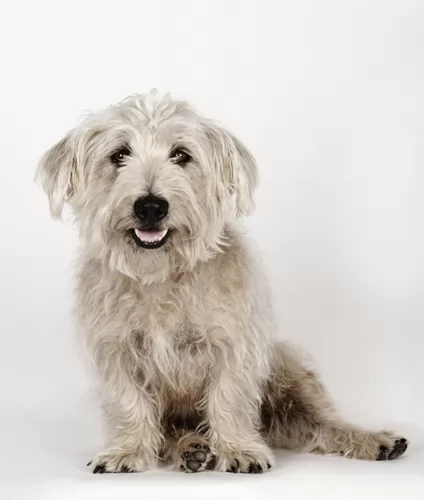 Hailing from Ireland and known also as the Wicklow Terrier or just Glen, the Glen of Imaal Terrier was used to get rid of rats, badgers and otters as well as being a good all-round farm dog.
Hailing from Ireland and known also as the Wicklow Terrier or just Glen, the Glen of Imaal Terrier was used to get rid of rats, badgers and otters as well as being a good all-round farm dog.
Using his strength, he was good at digging into burrows to root out badgers, but unlike other terriers, he wouldn’t go on and on yapping around his prey. He isn’t an excessive barker.
The terrier was recognised by the Irish Kennel Club in 1934 and later by the American Kennel Club in 2004. The Canadian Kennel Club recognized Glens in 2017.
Known as the Talbot Hound, nobody really seems to have accurate records as to the origins of the Talbot dog breed but it seems to have originated in France.
It is believed that the Talbot, with his excellent nose, was a hunting dog, but he is now extinct.
It is thought that the dog descends from the beagle and the bloodhound. It came to England in 1066 and vanished towards the end of the 18th century.
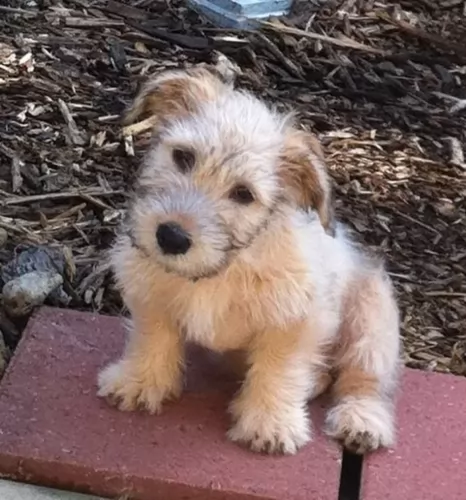 An interesting fact with the Glen of Imaal Terrier is that this is a dwarf breed, being a big sized dog on short legs, with the front feet turning out.
An interesting fact with the Glen of Imaal Terrier is that this is a dwarf breed, being a big sized dog on short legs, with the front feet turning out.
A typical Glen of Imaal Terrier stands at roughly 30 – 36cm and weighs up to about 16kg. Another interesting aspect with this dog is that it can take up to 4 years to reach maturity.
The head of this muscular dog is large, the ears are half erect, and while the tail has always been traditionally docked, it is often left long. The double coat of the dog is soft with the undercoat but he has a wiry outercoat. The color of the coat is essentially wheaten, tan or blue. The coat doesn’t shed much but some Glen owners strip excess hair a few times during the years.
Glen of Imaal terriers are energetic, easygoing and they make splendid pets for any family. He is more than happy to give up lying around for games and activity just to lie at his owner’s feet. He is an intelligent dog too and even though he is somewhat stubborn, he responds well to training and socialization. In fact training and socialization is important for every dog breed to prevent negative behavior and to ensure your pet is obedient.
The Talbot hound was a large, white purebred dog. He stood at roughly 58 to 69cm and weighed between 36 and 50kg.
He had a large head and a short, smooth, coarse pure white coat. He has a long tail which he held upright and fairly long floppy ears. He was a slow but efficient scenthound.
It is believed that this strong, hard working dog was gentle, loving and loyal and that he would have made an excellent family pet.
They were the kind of dogs that needed lots of social interaction with his human family. His amicable nature would have meant him getting on well with children and other dogs.
Slow, it’s a dog that had low intelligence and he may have taken a long time to learn any simple tricks or commands. If he were around today he wouldn’t have been suited to city living as he was a vocal breed – having quite a selection of barks and howls to voice his opinion.
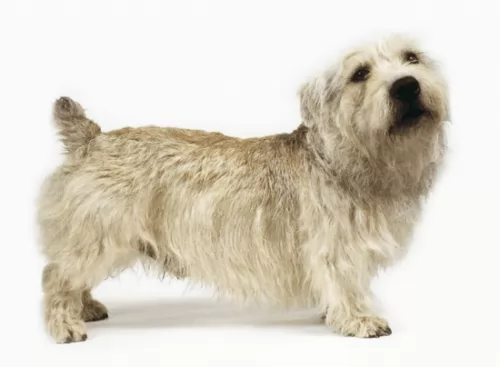 The Glen of Ismaal Terrier is more docile than other terrier breeds, but that doesn’t mean he isn’t feisty. He loves to play and is an adventurous dog, always on the lookout for exciting opportunities and to chase prey.
The Glen of Ismaal Terrier is more docile than other terrier breeds, but that doesn’t mean he isn’t feisty. He loves to play and is an adventurous dog, always on the lookout for exciting opportunities and to chase prey.
He is a good natured pet and he gets on well with adults, children and pets in the home. He can adapt well to life in the city or in the countryside so long as he is with his family members.
He isn’t a couch potato dog though, and wherever he lives, he will need a good amount of exercising. Treat him with the love and respect he craves, and you’ll have a wonderful canine companion.
The Talbot is extinct, but he was no doubt a docile, calm kind of dog that would have made a great family pet.
He would have been an ideal dog for first time dog owners too as he was a gentle, affectionate dog.They were tough, protective, stubborn but loving and loyal, and more’s the pity that this dog has disappeared.
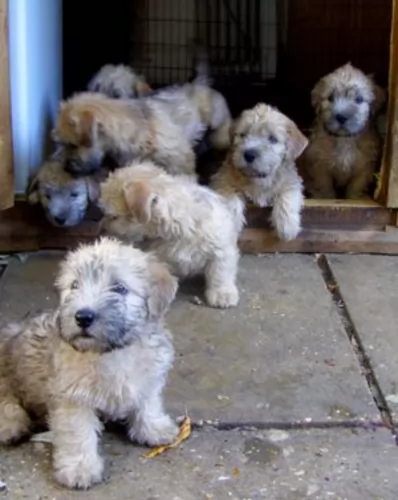 The Glen of Imaal Terrier is a feisty, healthy breed, particularly when he gets the best food there is, then he is not likely to get ill easily.
The Glen of Imaal Terrier is a feisty, healthy breed, particularly when he gets the best food there is, then he is not likely to get ill easily.
However, just like other dogs, he can be prone to certain health conditions such as hip dysplasia. When a dog is diagnosed with hip dysplasia, the socket part of the joint is poorly developed, so that is causes abnormal friction.
Inflammation and pain can be the result and your dog can become lame. Unfortunately, rapid weight gain with puppies can put more stress on the hips, and diets without the right balance of vitamins and minerals can be bad for good bone development.
Nobody can say what the health status of the Talbot dog was, but being a hunting dog, out in the open and getting plenty of exercise, he was no doubt a healthy dog. But all dogs can fall ill at some time or another with any one of the many dog illnesses there are -
Ear infections in dogs are quite common, but more so with dogs that have floppy ears.
You’ll see your pet scratching and pawing at his ears and shaking his head. There will in all likelihood be redness in your pets ears and you may even detect an abnormal odor.
There are quite a few things that can cause these ear infections in dogs such as ear mites, an excess of dirt and wax and bacteria.
Don’t allow your pet to suffer – get him to the vet. Your veterinarian will also show you how you can clean the ear for future times with a gentle cleanser. You have to be so careful not to rupture the ear drum, and some people prefer to get their vet to do this or professional groomers.
The Talbot could have suffered with ectropion – when the lower lids are turned out. Ectropion disrupts the function of the lower lid so that it can't protect the eye, and there is abrasion of the surface of the eye.
This condition can also bring on conjunctivitis. Get your pet to the vet for treatment and relief.
The lifespan of the Talbot was anything from 9 to 12 years of age, and one or two other health problems that could have shortened his life were dermatitis, cancer, hip dysplasia and eye infections.
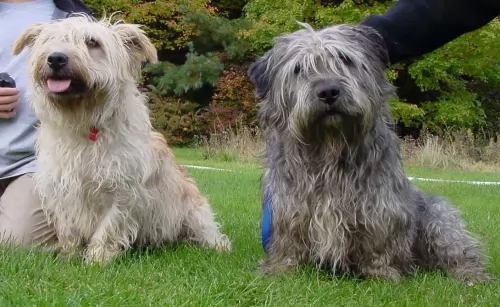 Caring for a Glen of Imaal isn’t going to be a huge job. This is what makes him such a wonderful pet as he is a straightforward pet, requiring little more than a brush to avoid the hair matting.
Caring for a Glen of Imaal isn’t going to be a huge job. This is what makes him such a wonderful pet as he is a straightforward pet, requiring little more than a brush to avoid the hair matting.
Check his ears, teeth and nails from time to time to ensure he is always in tip top condition.
If you intend making use of the convenience of commercially manufactured dog foods, the top quality one will provide you with balanced nutrition for your Glen and you can mix in some cooked brown rice, vegetables and chicken from time to time.
The Glen of Imaal Terrier is a small-breed dog and, he should be offered dog food that has been specially formulated for small, energetic dog breeds. You can also add in a little bit of raw meat into his kibble as a treat as this is important for keeping him free of skin allergies.
Make sure he always has a bowl of fresh, cool drinking water.
The Talbot with his short hair would have been looked upon as a low maintenance breed and would have required a brush now and again.
Because of the floppy ears, they would have needed to be checked inside for infection.
The Talbot was a strong, hard-working kind of dog so if commercially manufactured dog food was available in that time, you would have ensured a good quality one for strong, energetic dogs.
At that time, Talbot dog owners tossed their dogs bits of raw meat. Home-made food like boiled chicken, brown rice, spinach, carrots and sweet potatoes without any exotic flavorings would have been an excellent diet.